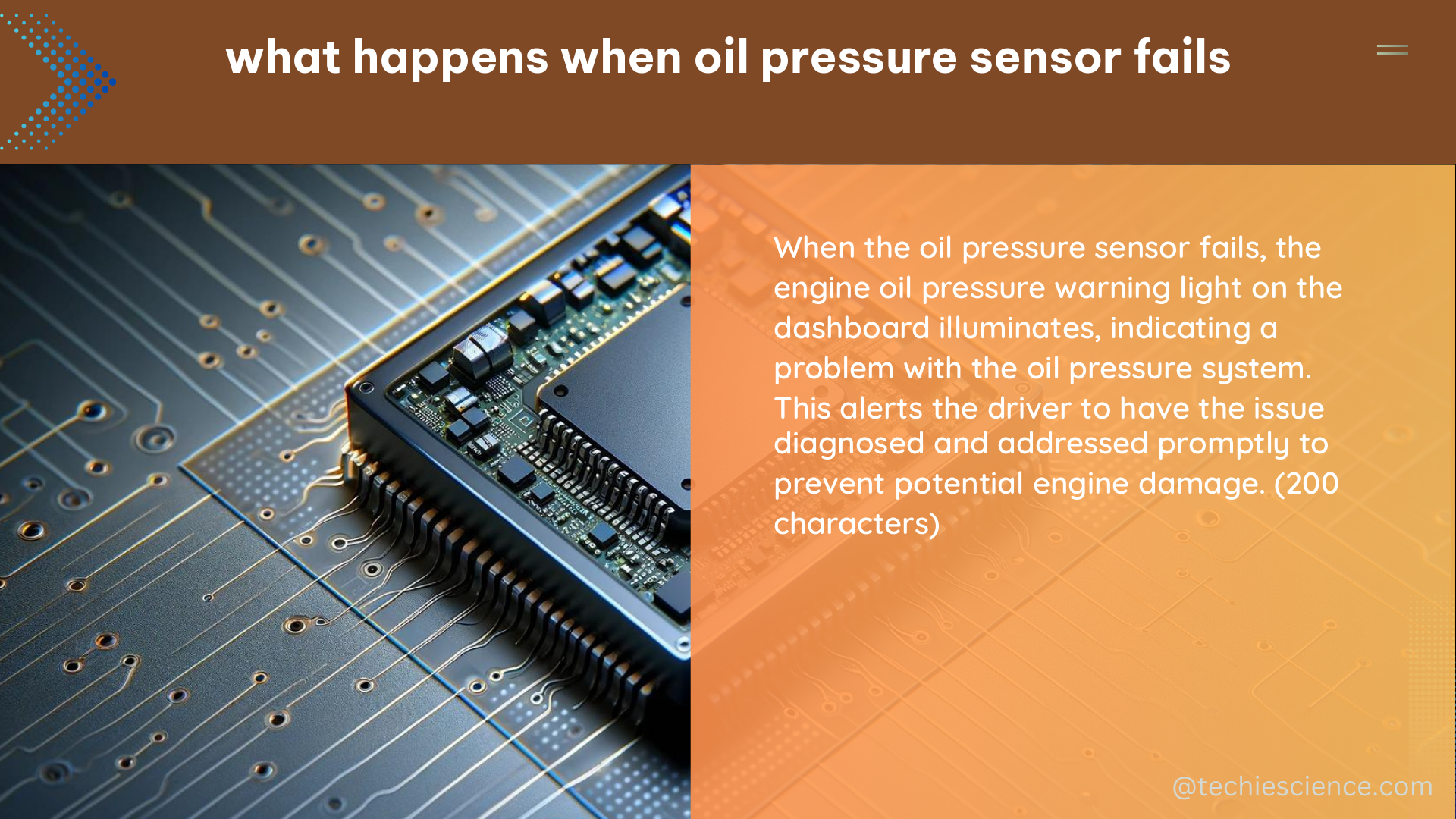When an oil pressure sensor fails, it can lead to a variety of issues with the engine and the vehicle’s overall performance. The oil pressure sensor is responsible for measuring the oil pressure in the engine and sending that information to the engine control module (ECM). The ECM uses this information to adjust the engine’s performance and prevent damage to the engine.
False Low Oil Pressure Reading
One of the most common issues that can occur when an oil pressure sensor fails is a false low oil pressure reading. This can cause the ECM to trigger a warning light on the dashboard, indicating that there is a problem with the oil pressure. In some cases, the ECM may also reduce engine power by up to 50% to prevent further damage to the engine. This reduction in engine power can lead to a decrease in fuel efficiency and an increase in engine wear and tear.
False High Oil Pressure Reading

Another issue that can occur when an oil pressure sensor fails is a false high oil pressure reading. This can cause the ECM to increase engine power, which can lead to increased wear and tear on the engine and other components. In some cases, a false high oil pressure reading can also cause the engine to overheat, which can lead to engine damage or even engine failure. The engine may run at higher temperatures, which can decrease the engine’s lifespan and increase the risk of engine failure.
Engine Rough Idling or Stalling
In addition to these issues, a failed oil pressure sensor can also cause the engine to run roughly or stall. This can occur because the ECM is not receiving accurate information about the oil pressure, which can cause it to make incorrect adjustments to the engine’s performance. This can lead to a variety of issues, such as misfiring, poor acceleration, and even engine stalling.
Technical Perspective
From a technical perspective, when an oil pressure sensor fails, it can cause a variety of issues with the engine’s sensors and control systems. For example, a failed oil pressure sensor can cause the ECM to receive inaccurate information about the engine’s performance, which can lead to incorrect adjustments to the engine’s fuel injection, ignition, and other systems.
Diagnosing a Failed Oil Pressure Sensor
To diagnose a failed oil pressure sensor, it is important to use a diagnostic tool that can communicate with the ECM and retrieve data from the engine’s sensors. This data can be used to identify any issues with the oil pressure sensor and other sensors in the engine. The diagnostic tool can provide specific readings and measurements, such as the current oil pressure, the voltage output of the sensor, and any error codes related to the oil pressure sensor.
Replacing the Oil Pressure Sensor
To fix a failed oil pressure sensor, it is typically necessary to replace the sensor with a new one. This can be done by removing the old sensor and installing a new one in its place. In some cases, it may also be necessary to reset the ECM to ensure that it is receiving accurate information from the new sensor.
Quantifiable Data
In terms of measurable, quantifiable data, a failed oil pressure sensor can cause a variety of issues with the engine’s performance. For example, a false low oil pressure reading can cause the ECM to reduce engine power by up to 50%, which can lead to a decrease in fuel efficiency and an increase in engine wear and tear. A false high oil pressure reading can cause the engine to run at up to 20% higher temperatures, which can lead to a decrease in engine life and an increase in the risk of engine failure.
Preventive Maintenance
To prevent issues with the oil pressure sensor, it is important to regularly maintain the engine and check the oil level and pressure. This can help to ensure that the engine is running at optimal performance and that the oil pressure sensor is providing accurate information to the ECM. Regular oil changes, using the recommended oil type and viscosity, and checking for any leaks or other issues can all help to maintain the engine’s oil pressure and prevent sensor failures.
References:
- Tanner Hodges, “Looking Back 2023”
- “GUIDELINES FOR SAMPLING”
- Emerson, “CONTROL VALVE HANDBOOK”
- “DoD Reliability Availability and Maintainability (RAM) Guide”
- “40 CFR Part 98 — Mandatory Greenhouse Gas Reporting”

The lambdageeks.com Core SME Team is a group of experienced subject matter experts from diverse scientific and technical fields including Physics, Chemistry, Technology,Electronics & Electrical Engineering, Automotive, Mechanical Engineering. Our team collaborates to create high-quality, well-researched articles on a wide range of science and technology topics for the lambdageeks.com website.
All Our Senior SME are having more than 7 Years of experience in the respective fields . They are either Working Industry Professionals or assocaited With different Universities. Refer Our Authors Page to get to know About our Core SMEs.